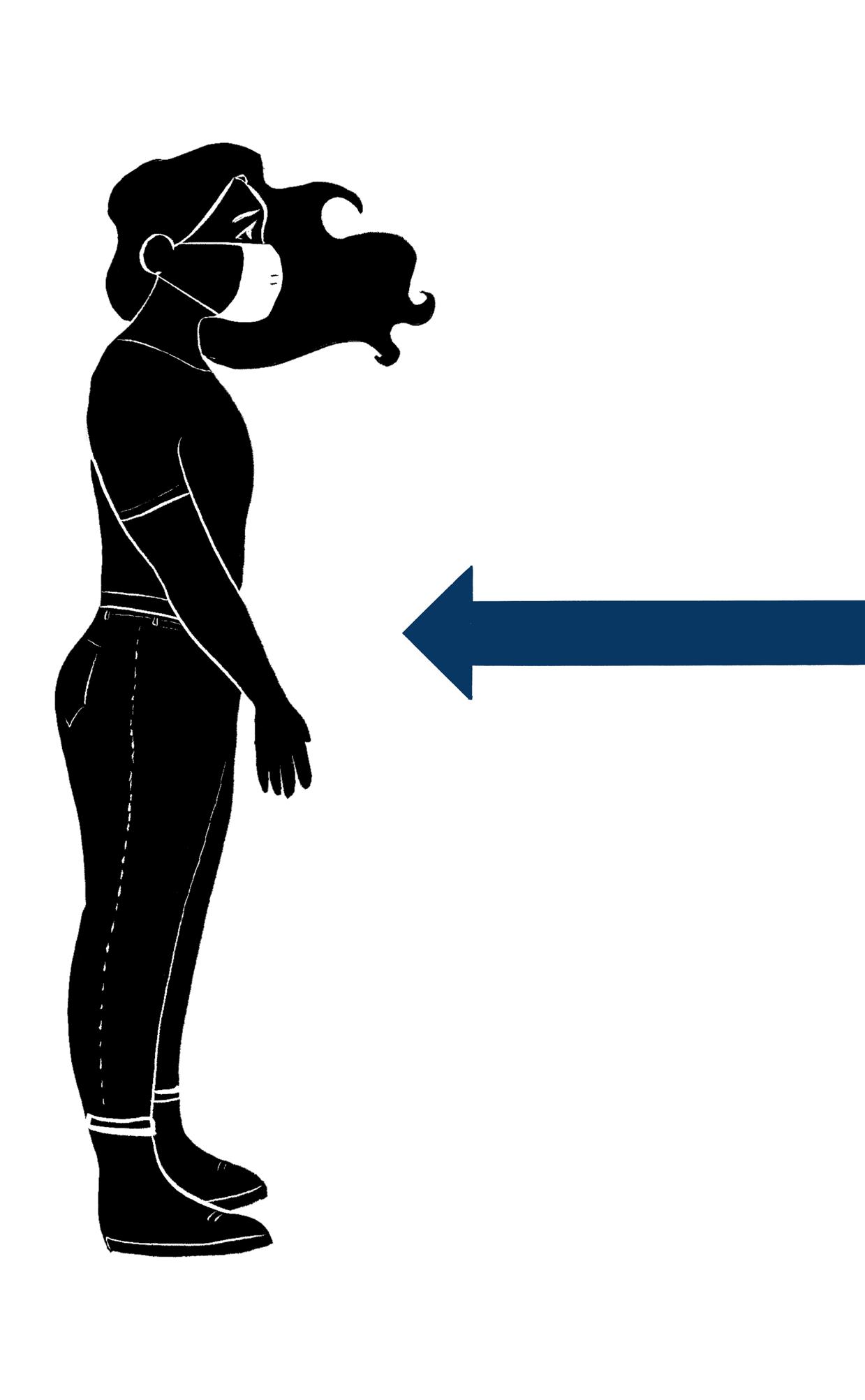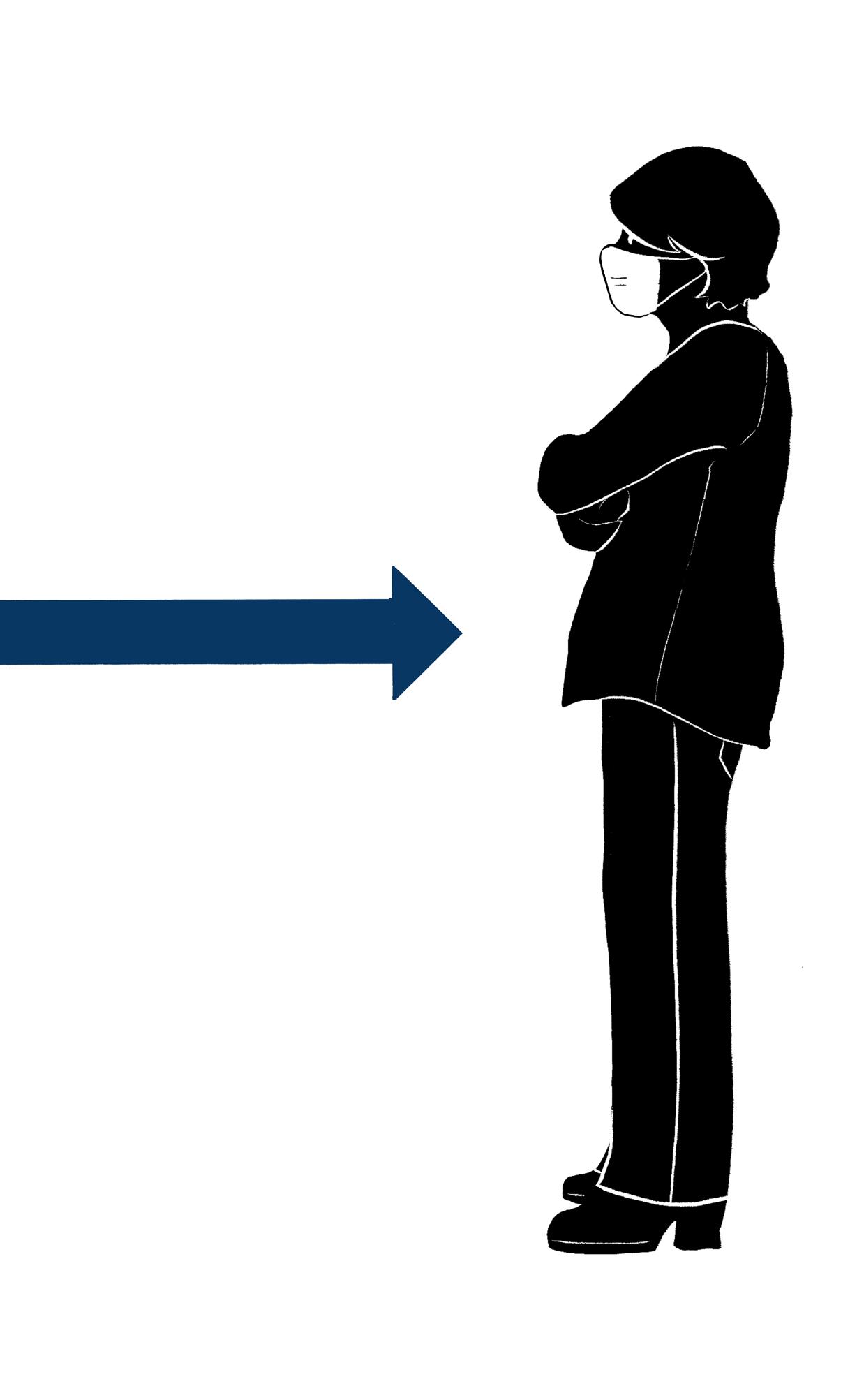
6 minute read
Lexi Scanlon Diego Perez Taylor Begert COVID-19 Helps People Recognize the Importance of Human Interaction
COVID-19 Helps People Recognize the Importance of Human Interaction
by Brianna Willis Art by Madeline Duvall
Buying groceries, going to the bank, eating at a restaurant, celebrating a loved one or just simply hugging someone has not looked the same since the World Health Organization declared COVID-19 a pandemic March 11.
COVID-19 has changed the way people are able to interact and communicate with each other in both positive and negative ways, said Thema Bryant-Davis, a psychology professor at Pepperdine’s Graduate School of Education and Psychology (GSEP).
With no clear end in sight, experts believe some of these changes are here to stay.
“In the positive, I think there’s going to be so much more appreciation for connection [because] a lot of those things we took for granted — like just running over to see a cousin or a grandparent or just gathering at a restaurant or a social space,” Bryant-Davis said. “There will be a higher gratitude, appreciation and value for relationships and a sense of community.”
From the bubonic plague to the swine flu, professionals said that after a pandemic there are some adjustments that tend to stick forever, — including using technology to connect. Other changes, such as wearing a mask, are only here temporarily.
Physical human interaction
During this time, physical touch with anyone from a friend to a loved one has decreased.
“I think one of the things that we’re all kind of thinking about is those small moments that we’ve taken for granted with our loved ones, you know,” Communication Professor Diana Martinez said. “Even when you think about the ability to hug a family member and what that means and just the emotional connection, that physical act and how that really is irreplaceable.”
GSEP Psychology Professor Shelly Harrell said people’s comfort with spontaneity has shifted due to the virus.
“I think about the news clips that I’ve seen of people who prior to coronavirus would be in a public place and completely give away free hugs and hold up signs like ‘free hugs’ — just the recognition that people need a hug,” Harrell said.
Hugging is important for human health and one of the most important ways people can show physical support, according to a Sheba Tel HaShomer Medical Center article. But with COVID-19, people have exchanged hugs for elbow bumps. “In the positive, I think there’s going to be so much more appreciation for connection [because] a lot of those things we took for granted. ...
There will be a higher gratitude, appreciation and value for relationships and a sense of community. — Thema Bryant-Davis, ”
Psychology Professor
The dating world
COVID-19 also affects human interaction and physical touch in the dating world.
“The way that people orient toward dating and finding partners [is different],” Harrell said. “What’s possible right now and how do we get to know each other in the same ways?”
Some in the dating world have continued to turn to online dating and other methods to try and find someone. But during the pandemic, it’s easier to take things slow after finding a partner.
“Others have suggested that that’s a benefit, so that there isn’t such a rush to kind of sexual relationship or premature kind of physical intimacy,” Harrell said. “They’re going, ‘Wait a minute, maybe we don’t want to jump into that so fast.’”
For now, dating practices have shifted.
“Now is this a forever thing? I don’t know,” Harrell said. “I think that when society shifts, there are things that last [and] the current way we interact with each other may not be forever.”
The new normal

Places such as school and work — where most people’s daily interaction comes from — have also changed during the pandemic.
Instead of playing with friends at recess, children are having Zoom playdates or using technology to interact with their peers.
Swap out playdates for happy hours and the same is true for adults.
While some public places have reopened, large gatherings are still banned in California and other states. Many argue a new normal has emerged.
“I will say, I usually speak at a lot of conferences and initially like every conference was canceled,” Bryant-Davis said. “But then they figured out these platforms to be able to offer the conferences online and as a faculty member and as a speaker, it’s easier for me to speak at a conference on the East Coast virtually.”
When conferences and big gatherings have to take place online, they can allow more individuals to attend because people have more flexibility to participate. Travel costs are reduced and all one has to do is log on.
Drive-by celebrations have emerged throughout the pandemic as a way to make a person feel special without having to spend hours at a fancy venue. Some people enjoy how easy the celebrations are.
“I have a few family members who had to have a driveby birthday situation,” Martinez said. “It was so sweet and so funny because they were saying how ‘Oh wow, this is really interesting you know, I didn’t have to clean my house. I didn’t have to decorate everything on the inside, my house is a mess.’”
While drive-by celebrations may stay for birthday and graduation celebrations because of the simplicity, the same is likely not true for memorials as COVID-19 regulations restrict numbers at funerals, limiting who can say goodbye.
“I think that it’s been really difficult for people who have to mourn the loss of a loved one, and have been unable to attend a funeral or a celebration of life,” Martinez said. “So,
whether it be in life or in grieving or in moments of death, it’s important to understand how valuable those human connections are and realizing the importance of these events on our lives.”
Weddings have also changed during this time with couples having to reduce their guest list and add COVID-19 safety precautions such as wearing a mask and providing hand sanitizer.
Pre-COVID-19, humans took interaction and communication with loved ones for granted. No one knew there would be a time where the ability to celebrate the life of someone would be snatched away.
“I think that when we get back to things, hopefully we’re all going to just take it with a little extra gratitude and extra connection,” Martinez said.
Staying connected
Now people are finding new ways to interact and build connections.
“I think what I most appreciate about [human interaction] is just feeling connected to someone else,” GSEP Psychology Professor LaTonya Wood said.
Harrell said one of her classes recently spent time talking about how they missed the casual conversations people had in-person before class. Conversations could be about anything from the Lakers game to what they’re going to get for lunch later.
In the virtual world however, most students wait until the moment class starts to log on to Zoom, which does not allow time for casual and organic conversations.
“There’s not as many opportunities for these informal ways that we build connections with each other,” Harrell said. “It’s not deep meaningful conversation but that’s how we feel a sense of connection and community is just by those little informal things.”
Harrell started to incorporate time for relaxed discussion in the beginning of class because she said these conversations are important.
Technology is also now allowing humans to stay more connected than ever with the ability to chat online.
Martinez said the world is going through dialectical tension, where even as people are more disconnected from each other, technology is allowing the world more ways to connect.
“We’re able to connect with people that at a different time would have been impossible,” Martinez said.
Now, technology is here to stay.
“As we begin to reconnect in other ways, those feelings and those emotions of saliency or how close we are to this issue and how much it’s affected our everyday lives will make us all connected in a very unique way to the situation and to our generation and the generations that are represented in this moment,” Martinez said.











